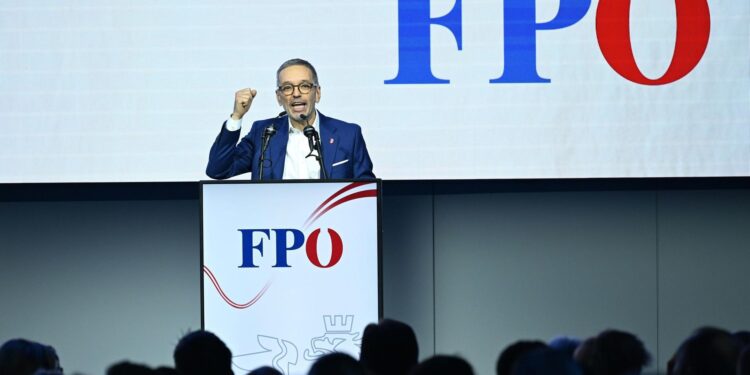The Freedom Party of Austria (FPĂ–) has surged to a record high in recent polls, capturing 38 per cent of voter support, according to Hungarian Conservative sources. This unprecedented rise positions the right-wing party as a dominant force in Austria’s political landscape, signaling potential shifts ahead of forthcoming elections. Analysts are closely watching the FPĂ–’s growing influence amid broader debates on immigration, national identity, and economic policy across Central Europe.
FPĂ– Surges to Historic Popularity in Austria Amid Shifting Political Landscape
The Freedom Party of Austria (FPĂ–) has reached an unprecedented level of support, securing 38 per cent in recent opinion polls, marking a significant shift in the nation’s political dynamics. This surge comes as traditional parties face growing disenchantment among voters, particularly amid debates over immigration, national identity, and economic policy. Analysts note that the FPĂ–’s straightforward messaging on sovereignty and conservative values resonates strongly with a broad spectrum of Austrians, from urban centers to rural communities.
Key factors driving the party’s growth include:
- Emphasis on national security: FPĂ–’s tough stance on border control and law enforcement appeals to voters worried about immigration pressures.
- Economic concerns: Promises to protect Austrian jobs and support small businesses amid global uncertainties.
- Political dissatisfaction: Increasing frustration with mainstream coalitions and perceived political inefficacy.
| Party | Current Poll (%) | Change from Last Month (%) |
|---|---|---|
| FPĂ– | 38 | +5 |
| Ă–VP (People’s Party) | 28 | -3 |
| Greens | 12 | -2 |
| SPĂ– (Social Democrats) | 15 | 0 |
Analyzing the Factors Behind the Rise of the Freedom Party
Recent polling indicating a surge in support for the Freedom Party, reaching an unprecedented 38 percent, can be attributed to a confluence of socio-political factors shaking Austria’s traditional landscape. Economic uncertainty, fueled by inflation and job market volatility, has driven a significant portion of voters toward parties promising stability and nationalist policies. The FPĂ–’s rhetoric, emphasizing sovereignty and strict immigration control, has resonated deeply amid public concerns over cultural identity and security. Furthermore, their strategic use of media platforms has expanded their outreach, particularly targeting younger demographics disillusioned with mainstream political entities.
Additionally, internal divisions and leadership struggles within Austria’s established parties have created opportunities for the Freedom Party to capitalize on voter dissatisfaction. Key elements contributing to the FPĂ–’s electoral momentum include:
- Charismatic Leadership: The party’s leader has skillfully crafted a message of national pride, appealing to traditional values.
- Populist Messaging: Promises to prioritize Austrian citizens over globalist agendas.
- Policy Focus: Emphasis on law and order, along with economic nationalism.
- Grassroots Mobilization: Organizing strong local support networks in rural and suburban areas.
| Factor | Impact on Voter Base | Electoral Outcome |
|---|---|---|
| Economic Anxiety | High | Increased FPĂ– Support |
| Immigration Concerns | Moderate to High | Consolidation of Right-Wing Votes |
| Establishment Fatigue | High | Shift Away from Traditional Parties |
| Leadership Appeal | Moderate | Improved Party Image |
Strategic Recommendations for Stakeholders Responding to FPĂ–’s Growing Support
Stakeholders across Austria and the broader European political landscape must adopt a multifaceted approach to address the surge in FPĂ–’s popularity, now polling at a record 38 per cent. Key actors in government, civil society, and media are encouraged to focus on enhancing transparency in policy communication, combating misinformation, and fostering inclusive dialogue that directly addresses voter concerns. Engaging with disenfranchised communities through targeted social programs can undermine the FPĂ–’s appeal rooted in populist narratives and economic anxieties.
To effectively counterbalance this political shift, stakeholders should consider the following strategic initiatives:
- Strengthen coalition-building efforts among moderate parties to present a united front.
- Invest in civic education campaigns emphasizing democratic values and social cohesion.
- Monitor and respond swiftly to disinformation campaigns, especially on social media platforms.
- Enhance community outreach programs aimed at integrating marginalized groups.
| Strategic Focus | Expected Impact |
|---|---|
| Coalition Building | Enhanced political stability and unified opposition |
| Civic Education | Long-term resilience against extremist rhetoric |
| Disinformation Countermeasures | Reduced spread of false narratives |
| Community Outreach | Greater social integration and trust-building |
In Summary
As the FPĂ– continues to surge in the polls, reaching an unprecedented 38 percent support, Austria’s political landscape appears increasingly volatile. Analysts will be watching closely to see whether this momentum translates into electoral success and how it may reshape future government coalitions. The coming months promise significant developments as the FPĂ– capitalizes on its growing popularity amidst ongoing national and regional challenges.
















